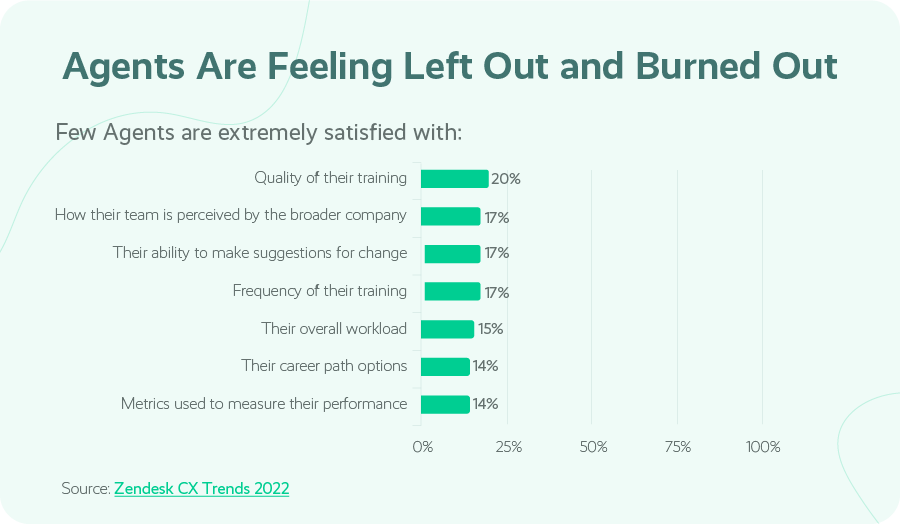5 Proven Strategies To Help Remote Contact Center Agents Feel Valued
Donuts in the breakroom, water cooler talk, lunch chats with teammates—they’re the little things that make going back to work on a Monday more bearable. For your remote agents, however, it’s often all work with little reward.
In addition to feeling the mental and emotional weight of consumer-facing jobs, remote contact center agents are experiencing redundancy that can make their jobs feel tedious. Physically separated from their coworkers, many of them are also feeling isolated and unappreciated by their employers.
According to Gallup, the level of engagement for remote employees has dropped more sharply than the engagement of other workers, thanks to the lack of clarity around expectations, recognition, and connection to the business. And with 69% of service agents considering leaving their customer service role altogether, it’s best to take action to improve morale.
Ignoring the issue is costly. The monetary impact of replacing experienced workers and onboarding their replacements is significant — and the whole process is a mental drain on your existing team.
The Work Institute recommends estimating turnover costs at 30% of an employee’s annual income. With an average contact center agent salary of $42,947, that’s almost $13,000 per agent. Yikes!
Five proven ways you can help remote agents feel more valued and cared for by your company — and ultimately reduce costly attrition — are:
- Improve your training program
- Use AI to automate workflow
- Involve agents in business decisions
- Create remote team-building opportunities
- Offer frequent recognition and rewards programs
Related Article: 4 Smart Reasons to Offer Remote Work in Your Contact Center
Improve Your Remote Contact Center Agent Training Program
A customer service agent can feel unexcited about their work if the training they’re given is inadequate. They can also feel like their company doesn’t value them enough to give them all of the resources they need to succeed.
Your employee training should be thorough, providing agents with each skill and data point to feel empowered to do their work. One way you can improve your training is by incorporating a tech-informed visual knowledge base of issues and solutions for your agents to study and put into practice.
Providing proper training—including soft skills coaching (like how to speak with customers and provide exceptional customer care) and technology training—signals to your remote customer service agents that you’re invested in their success.
Related Article: 3 No-Fail Remote Workforce Training Techniques Top Contact Centers Use

Use AI To Automate Workflow
When we say automate, we don’t mean replace all of your remote contact center agents with robots. Humans are still the very best way to provide solutions to complex customer problems.
What you should consider is using AI to reduce customer pain points, provide quicker solutions, and ultimately provide your remote contact center agents with more bandwidth and less stress.
Using cloud contact center technology, businesses can optimize the customer experience by providing more channels to address issues — like calls, SMS, and chat — and automated digital menus that direct customers to the exact agent they need to speak to or even the solutions that they need. Automation is a great tool, for example, to provide customers with company hours.
Contact center AI simplifies the customer service experience and provides self-service that can save time so there’s less friction between customer and agent. Hold times go down, and customer satisfaction goes up. That reduces much of the stress your remote agents’ experience.
AI tools can also offload repetitive tasks so that remote agents can devote more time and offer more personalized service to customers with complex problems. This way, they don’t get bogged down with rote tasks and can feel empowered because they’re providing meaningful solutions.
Related: 3 Tips For Optimizing Your Contact Center Schedule
Involve Remote Contact Center Agents in Business Decisions
Working remotely can put needless barriers between your agents and your company leadership so that agents don’t feel like they have a say in business decisions. To feel valued, remote agents have to be included, and the fact that they’re not in the building shouldn’t deter you from involving them.

Remote agents should be familiar with your company’s goals and strategies, and they should be invited to offer input about what’s working and what isn’t working. To foster remote agents’ connection to the company, you could conduct monthly anonymous surveys, invite them to company meetings, or hold check-ins to gauge their thoughts.
Remote agents are often the most equipped to speak to company pain points since they work at the front line of your customer service. Their input matters. Giving them opportunities to provide that input will help your agents feel empowered and invested in your company, and it will help your business improve, too.
Create Remote Team Building Opportunities
No person is an island, but when you’re a remote worker, it sure doesn’t feel that way. It can be pretty lonely out there in the land of donut-less breakrooms. It’s important to remember that team-building experiences are just as important for remote team members as they are to in-house teams, perhaps more so.
Consider organizing casual monthly coffee chats or Zoom calls where your remote agents have the opportunity to get to know their coworkers. This might take place in a virtual group setting or by pairing off agents. If your agents telework but also live close to home base, you might consider offsite coffee breaks or team lunches. Using Slack channels to talk about non-work-related topics is another creative avenue to get to know remote team members and vice versa.
Given the opportunity to get to know their coworkers in a different setting, agents can feel a sense of camaraderie and support that will help them feel part of a team and build connections with coworkers. Both are critical to retention.
Related Article: Best Contact Center Games to Play Remotely
Recognize The Efforts Of Your Remote Agents
It bears repeating: Remote customer service agents are the front line of your business. They get to see firsthand what people like or don’t like about your business. They’re interacting with the most difficult customers and doing the bulk of the problem-solving for your company. That work is often messy, frustrating, and thankless — and it shouldn’t be.
To make your remote agents feel like they’re valued, recognize their achievements! Set goals and milestones with them and then celebrate them when they reach those milestones. Offer them incentives or performance-based rewards they can work toward.
Even if it’s just reaching out to them after a particularly difficult customer interaction, let them know how much you appreciate them and that you’re in their corner.
Agents who don’t have clear goals to work toward, a clear “why” behind their work, or a manager to encourage them will struggle to feel valued. Recognizing them is an important way to see and include them.
Related Article: 13 Easy and Creative Contact Center Rewards and Recognition Ideas
The Takeaway
Remote agents are a critical part of your business’ success, but they also face daunting obstacles. By offering them thorough training, providing them with digital tools that streamline their workflow and eliminate stress, and involving and recognizing their contributions, you can create a work environment where remote workers feel valued and appreciated — no breakroom snacks necessary.
Learn more about how intelligent contact center technology can help you drive profitable customer experiences in this webinar.






